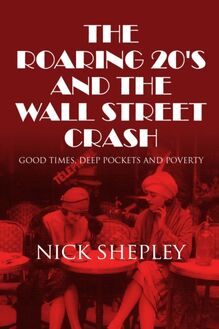-
 Univers
Univers
-
 Ebooks
Ebooks
-
 Livres audio
Livres audio
-
 Presse
Presse
-
 Podcasts
Podcasts
-
 BD
BD
-
 Documents
Documents
-
- Cours
- Révisions
- Ressources pédagogiques
- Sciences de l’éducation
- Manuels scolaires
- Langues
- Travaux de classe
- Annales de BEP
- Etudes supérieures
- Maternelle et primaire
- Fiches de lecture
- Orientation scolaire
- Méthodologie
- Corrigés de devoir
- Annales d’examens et concours
- Annales du bac
- Annales du brevet
- Rapports de stage
La lecture à portée de main
Vous pourrez modifier la taille du texte de cet ouvrage
Découvre YouScribe en t'inscrivant gratuitement
Je m'inscrisDécouvre YouScribe en t'inscrivant gratuitement
Je m'inscrisEn savoir plus
Vous pourrez modifier la taille du texte de cet ouvrage
En savoir plus

Description
Sujets
Informations
| Publié par | Andrews UK |
| Date de parution | 07 décembre 2015 |
| Nombre de lectures | 0 |
| EAN13 | 9781783331130 |
| Langue | English |
Informations légales : prix de location à la page 0,0150€. Cette information est donnée uniquement à titre indicatif conformément à la législation en vigueur.
Extrait
Title Page
HITLER, RIBBENTROP AND BRITAIN
The Breaking of Versailles Part One
by
Nick Shepley
Publisher Information
Published in 2013 by
Andrews UK Limited
www.andrewsuk.com
The right of Nick Shepley to be identified as the Author of this Work has been asserted by him in accordance with the Copyright, Designs and Patents Act 1998
Copyright © 2013 Nick Shepley
All rights reserved. No part of this publication may be reproduced, stored in a retrieval system, or transmitted, in any form or by any means without the prior written permission of the publisher, nor be otherwise circulated in any form of binding or cover other than that in which it is published and without a similar condition being imposed on the subsequent purchaser. Any person who does so may be liable to criminal prosecution and civil claims for damages.
The Breaking of Versailles Part One
Adolf Hitler was a man who was most comfortable working with a high degree of informality and he hated bureaucrats, paperwork, meetings and most other conventions of officialdom. He was far too certain of his own judgement, and his arrogance led him to place his trust in often embarrassingly unreliable or untrustworthy subordinates. Similarly, efficient, capable and professional men, particularly generals, were sidelined and ignored at times when their advice could well have determined the outcome of the Second World War. In this volume of Explaining Modern History, we will look at Hitler’s foreign policy goals, his relationship with the British up until 1936, and his chief agent in negotiations between the two powers, Joachim Von Ribbentrop. I will cover Hitler’s involvement in the Spanish Civil War, the remilitarisation of the Rhineland, the Anschluss with Austria and the destruction of Czechoslovakia in part two of this series.
In 1924, whilst living in the comparative comfort of Landsberg Prison following his incarceration after the failed attempt to seize power during the Munich Putsch, Hitler wrote his rambling manifesto, Mein Kampf. With the awestruck Rudolf Hess as his scribe, he poured out his thoughts and feelings about, amongst other things, hearing the news of the Treaty of Versailles. Hess faithfully recorded his thoughts about the day he heard of the armistice:
“Everything went black before my eyes; I tottered and groped my way back to the ward, threw myself on my bunk, and dug my burning head into my blanket and pillow. So it had all been in vain. In vain all the sacrifices and privations; in vain the hours in which, with mortal fear clutching at our hearts, we nevertheless did our duty; in vain the death of two million who died. Had they died for this? Did all this happen only so that a gang of wretched criminals could lay hands on the Fatherland.
I knew that all was lost. Only fools, liars and criminals could hope for mercy from the enemy. In these nights hatred grew in me, hatred for those responsible for this deed. Miserable and degenerate criminals! The more I tried to achieve clarity on the monstrous events in this hour, the more the shame of indignation and disgrace burned my brow.”
Since he began his career in politics in 1919 Hitler had been determined to undo the Treaty Of Versailles. In his speeches throughout the late 1920s and early 1930s, as Nazi fortunes improved, he made comparatively few speeches about the Jews, anxious not to offend or worry more conservative voters, but his impassioned appeals to an ingrained sense of anger and grievance over the treaty were well received.
John Maynard Keynes was amongst the many commentators at the Paris Peace Conference who recognised the resentment the treaty was likely to engender. The German delegation had not been invited to attend the deliberations, and the big three, David Lloyd George, Georges Clemenceau and Woodrow Wilson found between themselves a compromise which ultimately put off the date of the next war, instead of ending all wars, as was naively hoped for.
Clemenceau, the ‘Tiger of France’, knew his role well. He was present at the conference to articulate the anger and the desire for revenge of the French people after four years of horrific war fought mainly on French soil.
Lloyd George wrote in 1938, as the next European war was about to break out that:
“There never was a greater contrast, mental or spiritual, than that which existed between these two notable men (Wilson and Clemenceau). Wilson with his high but narrow brow, his fine head with its elevated crown and his dreamy but untrustful eye - the make-up of the idealist who is also something of an egoist; Clemenceau, with a powerful head and the square brow of the logician - the head conspicuously flat topped, with no upper storey in which to lodge the humanities, the ever vigilant and fierce eye of the animal who has hunted and been hunted all his life. The idealist amused him so long as he did not insist on incorporating his dreams in a Treaty which Clemenceau had to sign.
It was part of the real joy of these Conferences to observe Clemenceau’s attitude towards Wilson during the first five weeks of the Conference. He listened with eyes and ears lest Wilson should by a phrase commit the Conference to some proposition which weakened the settlement from the French standpoint. If Wilson ended his allocution without doing any perceptible harm, Clemenceau’s stern face temporarily relaxed, and he expressed his relief with a deep sigh. But if the President took a flight beyond the azure main, as he was occasionally inclined to do without regard to relevance, Clemenceau would open his great eyes in twinkling wonder, and turn them on me as much as to say: “Here he is off again!”
The French President Raymond Poincare, who existed in an uneasy alliance with Clemenceau, then Prime Minister, spoke of the angry, suspicious patriot during the proceedings:
“Today Clemenceau is angry with the English, and especially with Lloyd George. -I won’t budge,” he said, - I will act like a hedgehog and wait until they come to talk to me. I will yield nothing. We will see if they can manage without me. Lloyd George is a trickster. He has managed to turn me into a “Syrian”. I don’t like being double-crossed. Lloyd George has deceived me. He made me the finest promises, and now he breaks them. Fortunately, I think that at the moment we can count on American support. What is the worst of all is that the day before yesterday, Lloyd George said to me. “Well, now that we are going to disarm Germany, you no longer need the Rhine”. I said to Clemenceau: “ Does disarmament then seem to him to give the same guarantees? Does he think that, in the future, we can be sure of preventing Germany from rebuilding her army?” “We are in complete agreement,” said Clemenceau; “ it is a point I will not yield.”
The conflicting demands of the three victorious powers and their visions for the post war world has been investigated in a previous ebook Britain, France, Germany and the Treaty of Versailles, so I won’t delve too deeply into it here, suffice to say the following; Hitler was presented an historic opportunity by the mistakes and failures made at the Paris Peace Conference. The sense of grievance was palpable in German politics throughout the 1920s, it fundamentally undermined Weimar democracy, as it was the statesmen of the new republic, the ‘November Criminals’ as Hitler called them, who signed the treaty in the first place. Gustav Stresseman, in his capacity as foreign minister in 1925 carefully skirted away from doing too much that might look like he was cooperating with the allies and working too hard to pay back reparations, it was electorally very dangerous to be seen as pro treaty.
In this and the following ebook we will examine a four year period, from 1935 to 1939 and chart the evolution of Hitler’s attempts to destroy the treaty. His journey from cautious foreign policy novice to gambler would shape the course of the war, lead his generals to the brink of mutiny and see Britain and France fooled and cowed by an epic game of bluff. Our journey begins, however, not with Hitler, but a man who fooled even him, Joachim Von Ribbentrop.
Part One: Hitler’s Conman
In the childhoods of many leading Nazis one theme that seems to emerge time and time again is a particular kind of youthful hubris, an arrogance that never seems to be matched by ability.
In Joachim Ribbentrop’s case (he adopted the ‘Von’ later on, or rather it adopted him, to falsely give himself an aristocratic bearing), he was thought by his teachers to be a mediocre pupil with little if any discernible talent. It was the verdict of his schoolmaster that the young Ribbentrop was:
“ the most stupid in his class, full of vanity and very pushy”
His vanity and pushiness would shape his interactions with others in adult life and would almost single handedly derail Hitler’s foreign policy as regarded Britain.
Ribbentrop’s father, Richard Ulrich Ribbentrop allowed his mouth to get the better of him, he was forced out of the German Army after making disparaging comments about Kaiser Wilhelm’s sexuality. It seems likely that the arrogant and foolhardy attitudes that Ribbentrop would display in later life were modelled directly on his father.
The family suffered long spells of austerity as Ribbentrop Snr found it difficult to find work. Ribbentrop Jnr drifted from France to Canada, he entertained hopes of a colonial life in German East Africa, the young Joachim was particularly keen on establishing himself as a plantation owner. However, fate interceded, and in 1910 he fond himself in Montreal, deeply in love with wealthy socialite, Catherine Bell.
He stayed in North America, working in the USA and Canada until 1914 when war broke out and he returned to Germany to enlist.
He served in the Hussa
-
 Univers
Univers
-
 Ebooks
Ebooks
-
 Livres audio
Livres audio
-
 Presse
Presse
-
 Podcasts
Podcasts
-
 BD
BD
-
 Documents
Documents
-
Jeunesse
-
Littérature
-
Ressources professionnelles
-
Santé et bien-être
-
Savoirs
-
Education
-
Loisirs et hobbies
-
Art, musique et cinéma
-
Actualité et débat de société
-
Jeunesse
-
Littérature
-
Ressources professionnelles
-
Santé et bien-être
-
Savoirs
-
Education
-
Loisirs et hobbies
-
Art, musique et cinéma
-
Actualité et débat de société
-
Actualités
-
Lifestyle
-
Presse jeunesse
-
Presse professionnelle
-
Pratique
-
Presse sportive
-
Presse internationale
-
Culture & Médias
-
Action et Aventures
-
Science-fiction et Fantasy
-
Société
-
Jeunesse
-
Littérature
-
Ressources professionnelles
-
Santé et bien-être
-
Savoirs
-
Education
-
Loisirs et hobbies
-
Art, musique et cinéma
-
Actualité et débat de société
- Cours
- Révisions
- Ressources pédagogiques
- Sciences de l’éducation
- Manuels scolaires
- Langues
- Travaux de classe
- Annales de BEP
- Etudes supérieures
- Maternelle et primaire
- Fiches de lecture
- Orientation scolaire
- Méthodologie
- Corrigés de devoir
- Annales d’examens et concours
- Annales du bac
- Annales du brevet
- Rapports de stage




















